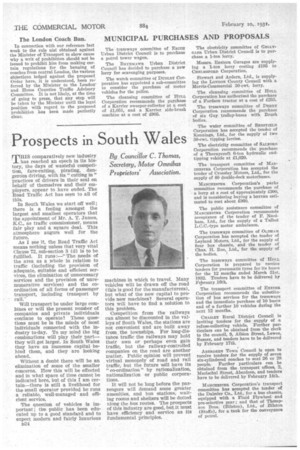Prospects in South Wales
Page 86

If you've noticed an error in this article please click here to report it so we can fix it.
By Councillor C. Thomas, Secretary, Motor Omnibus Proprietors' Association.
tril HIS comparatively new industry
has reached an epoch in its history, the days of wasteful competition, fare-cutting, pirating, dangerous driving, with its "cutting in" practices of drivers in their zeal on behalf of themselves and their employers. appear to have ended. The Road Traffic Act has seen to all of this.
In South Wales we start off well; there is a feeling amongst the largest and smallest operators that the appointment of Mr. A. T. James, K.C., as traffic commissioner, means fair play and a square deal. This atmosphere augurs well for the future.
As I see it, the Road Traffic Act means nothing unless that very vital Clause 72, sub-section 3 (d) is to be fulfilled. It runs :—" The needs of the area as a whole in relation to traffic (including the provision of adequate, suitable and efficient services, the elimination of unnecessary services and the provision of unremunerative services) and the coordination of all forms of passenger transport, including transport by Will transport be under large combines or will the present number of companies and private individuals continue to operate? These questions must be in the minds of most Individuals connected with the industry to-day. To my mind the big combinations will play their part— they will get larger. In South Wales they have an immense capital behind them, and they are looking ahead.
Without a doubt there will be an elimination of some of the smaller concerns. Bow this will be effected and in what space of time cannot be indicated here, but of this I am certain—there is still a livelihood for the small operator provided he runs a reliable, well-managed and efficient service.
The question of vehicles is linportant ; the public has been educated up to a good standard and to expect modern and fairly luxurious D24
machines in which to travel. Many vehicles will be drawn off the road (this is good for the manufacturers), but what of the new capital to provide new machines? Several operators will have to find a solution to this problem.
Competition from the railways can almost be discounted in the valleys of South Wales, the stations are not convenient and are built away from the townships. For long-distance traffic the railways may hold their own or perhaps even gain traffic, but the railway-controlled companies on the road are another nYatter. Public opinion will prevent virtual monopoly of road and rail traffic, but the future will have its " co-ordination " by rationalization, nationalization or public corporations.
It will not be long before the passengers will demand some greater amenities, and bus stations, waiting rooms and shelters will be dotted along the bus routes. The prospects of this industry are good, but it must have efficiency and service as its fundamental principles.




























































































































































































